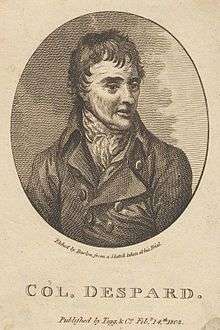Edward Despard

Edward Marcus Despard (1751 – 21 February 1803) was an Irish soldier who served in the British Army. During the American War of Independence Despard led a force to victory at the Battle of the Black River, securing the British presence on the Mosquito Coast. Following the war Despard was appointed Superintendent of what became British Honduras. He was recalled to London in 1790 after questions were raised about his conduct. Despard soon found himself in jail for debt. He later took up revolutionary politics, becoming involved with the United Britons movement, and was executed for high treason for his part in the failed Despard Plot.
Early life
Edward Despard was born in 1751 into a Protestant family of Huguenot and Anglo-Irish descent[1] in Coolrain, Camross, Queens County,[2] Ireland. He was one of five brothers all of whom except the eldest, who inherited the family estate, served in the British military.[3] His elder brother John Despard (1745–1829) was an army officer who rose to the rank of full General.
Early career
In 1766 he entered the British British Army as an Ensign in the 50th Foot.[4] He was promoted to Lieutenant in 1772, and stationed at Jamaica, where he soon proved himself to have considerable engineering talent.
American War of Independence

When the American War of Independence broke out the regiment, heavily under strength, remained in the West Indies rather than joining the army of William Howe attempting to suppress the rebellion.[5] He served in the West Indies with credit, being promoted to Captain after taking part in the unsuccessful 1780 San Juan expedition. Despard struck up a friendship with the naval officer Horatio Nelson, who played a leading role in the San Juan campaign.
In 1782 he commanded a successful expedition to recover the British settlement of Black River on the Mosquito Coast of present-day Honduras that the Spanish had taken. In 1783 the war was brought to an end by the Peace of Paris.
Honduras
Despard was subsequently made Superintendent of the Bay of Honduras, which later became British Honduras and then Belize. He administered this British enclave until 1790 when he had married a young black woman, Catharine, and staked his reputation on giving the same rights to freed slaves as to white settlers.
This however did not go down well with some of the settlers. These settlers sent letters of protest to London and as a result Despard was summoned back to London to explain himself. He was suspended by Home Secretary Lord Grenville. From 1790 to 1792 these charges were investigated, and he was suspended on half pay with his expenses from the Bay of Honduras withheld. Pursued by a further lawsuit from his enemies in the Bay, he was arrested and confined in King's Bench Prison from 1792 to 1794.
Radical
On his release he joined the London Corresponding Society. In 1798 Despard was arrested on suspicion of involvement in the Irish Rebellion. Habeas Corpus had been suspended in 1794, and Despard was held without trial for nearly three years in a succession of prisons, notably Coldbath Fields Prison in Clerkenwell, until he was released without charge in 1801.
Despard Plot
In late 1802 he was named by government informers and disaffected soldiers as a member of a conspiracy engaged in a plot to seize the Tower of London and Bank of England and assassinate King George III to encourage further uprisings. Only one week before the plot was to take place, Despard and his co-conspirators were arrested in a pub in Lambert on suspicion of plotting an uprising. The evidence was thin but Despard was arrested and prosecuted by Attorney General Spencer Perceval, before Lord Ellenborough, the Lord Chief Justice. Despite a dramatic appearance by Lord Nelson as character witness on his behalf, Despard was found guilty by the jury of high treason, and sentenced, with six of his fellow-conspirators (John Wood and John Francis, both privates in the army, carpenter Thomas Broughton, shoemaker James Sedgwick Wratton, slater Arthur Graham, and John Macnamara),[6] to be hanged, drawn and quartered. It was the last time that anyone received that sentence in England.
Prior to execution the sentence was commuted to simple hanging and beheading, amid fears that the draconian punishment might spark public dissent. Despard was executed on the roof of the gatehouse at Horsemonger Lane Gaol, in front of a crowd of at least 20,000 spectators, on 21 February 1803. This was the largest public gathering until the funeral of Lord Nelson following the Battle of Trafalgar.
References
 This article incorporates text from a publication now in the public domain: Chisholm, Hugh, ed. (1911). "Despard, Edward Marcus". Encyclopædia Britannica. 8 (11th ed.). Cambridge University Press. p. 101.
This article incorporates text from a publication now in the public domain: Chisholm, Hugh, ed. (1911). "Despard, Edward Marcus". Encyclopædia Britannica. 8 (11th ed.). Cambridge University Press. p. 101.
Bibliography
- Chavez, Thomas E. Spain and the Independence of the United States: An Intrinsic Gift. University of New Mexico Press, 2003.
- Conner, Clifford D., "Colonel Despard: The Life and Times of an Anglo-Irish Rebel" (Combined Publishing 2000)
- Jay, Mike, The Unfortunate Colonel Despard (Bantam Press 2004)
- Oman, Charles William Chadwick. Unfortunate Colonel Despard and Other Studies. Burt Franklin, 1922.
| Government offices | ||
|---|---|---|
| Preceded by James Lawrie |
Superintendent of British Honduras 1787–1790 |
Succeeded by Peter Hunter |